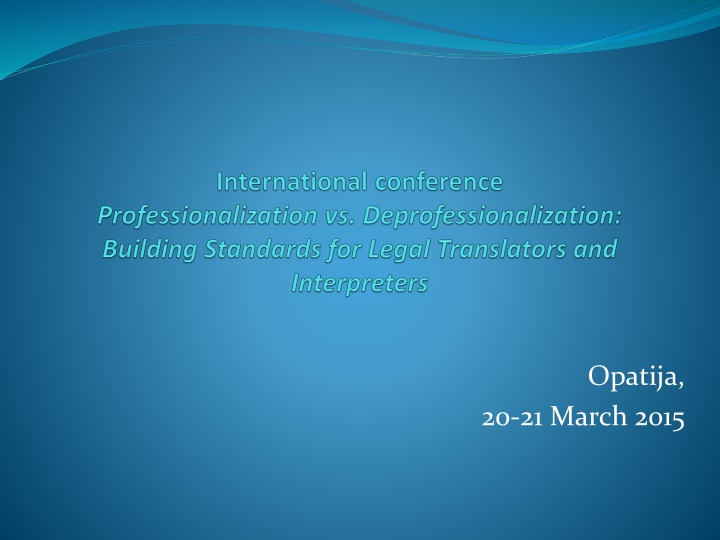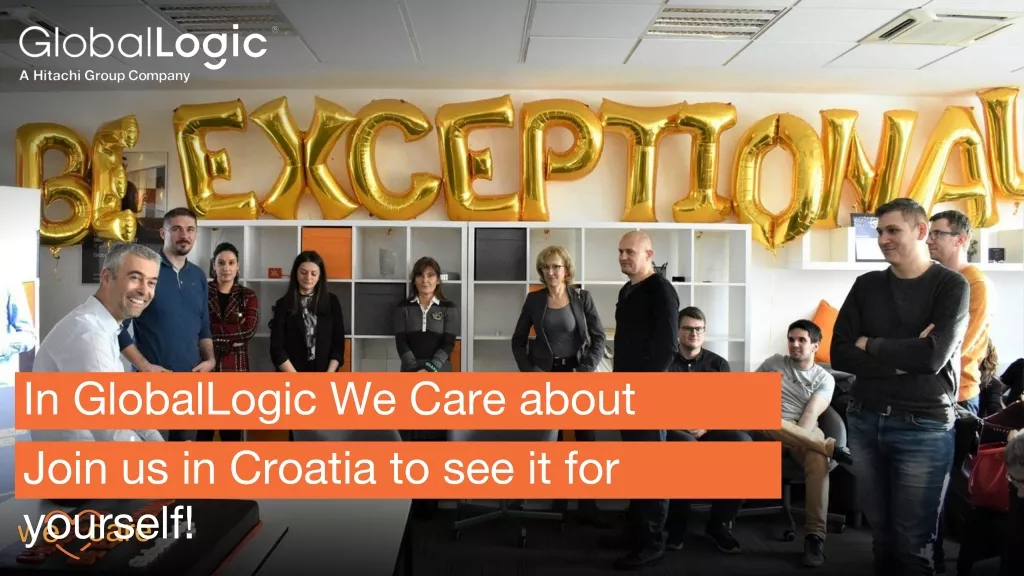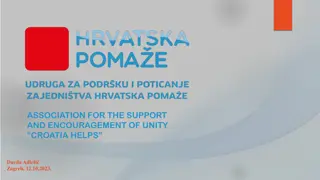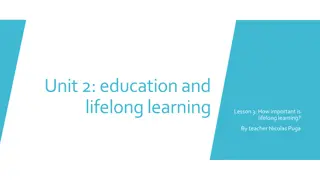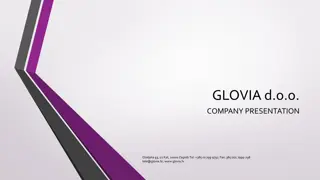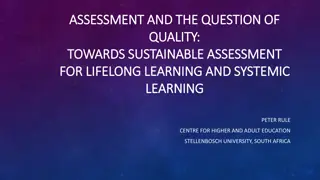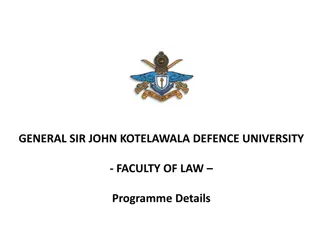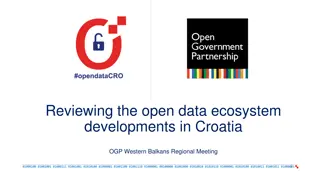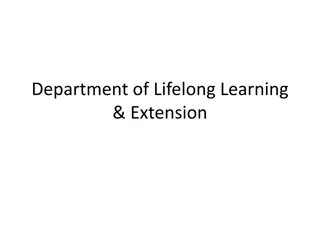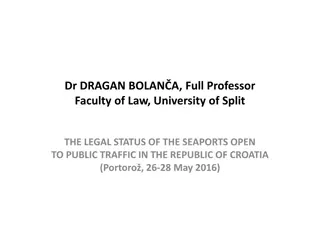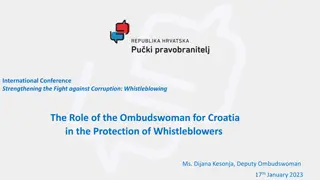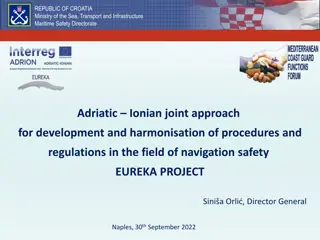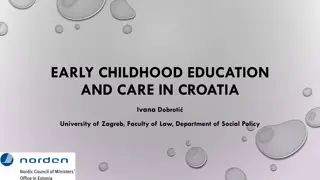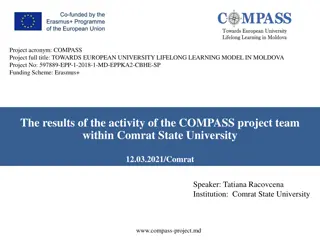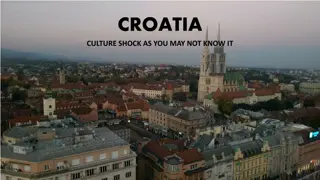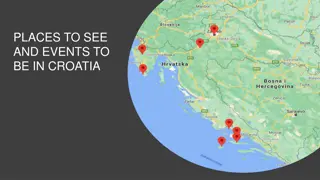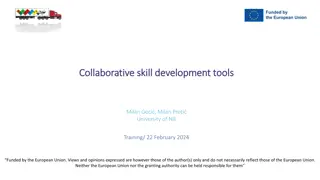Advancing Legal Language Education in Croatia through Lifelong Learning Programs at University of Osijek
In March 2015, the Faculty of Law at the University of Osijek in Croatia conducted a program focused on educating lawyer linguists. The initiative aimed to enhance the skills of FL teachers and lawyers, aligning with Bologna requirements. Workshops on EU Law, Legal Translation, and more were conducted, led by renowned professors. The knowledge gained empowered Croatian LSP teachers to adapt to new challenges in legal education, driven by evolving European dynamics and international communication needs.
Download Presentation

Please find below an Image/Link to download the presentation.
The content on the website is provided AS IS for your information and personal use only. It may not be sold, licensed, or shared on other websites without obtaining consent from the author.If you encounter any issues during the download, it is possible that the publisher has removed the file from their server.
You are allowed to download the files provided on this website for personal or commercial use, subject to the condition that they are used lawfully. All files are the property of their respective owners.
The content on the website is provided AS IS for your information and personal use only. It may not be sold, licensed, or shared on other websites without obtaining consent from the author.
E N D
Presentation Transcript
Opatija, 20-21 March 2015
Education of Lawyer Linguists within the Lifelong Learning Programme at the Faculty of Law, University of Osijek Ljubica Kordi , Faculty of Law, University of Osijek, Croatia
Structure of the presentation: Introduction 1. Lifelong Learning Programme for Lawyer Linguists purpose and description of specific courses 2 Design of the course Introduction to Legal Translation and Terminology 2 Conclusion: achievements and limitations of the Programme 3
1. Introduction Teachers teaching FL for Legal Purposes at the Faculty of Law, University of Osijek, got the opportunity to participate several years ago in the TEMPUS project Foreign Languages in the Field of Law FLIFL , initiated and coordinated by the Faculty of Law, University of Zagreb. The main goals of the project were defined as 1) education of FL teachers employed at Croatian law faculties in order to improve their professional credibility in LSP ( Teacher Training Programmes ) 2) education of lawyers in foreign languages ( Lawyer Training Programmes ) and 3) development of FL curricula and modern teaching methodology in conformity with the Bologna requirements
Teacher training - a series of workshops on EU Law, European Private Law, European Comparative Law, the Analysis of EU Law, Legal Translation and Terminology, Communication Skills for Lawyers, Introduction to Forensic Linguistics, ... Workshops - delivered by eminent professors from European universities, like Peter Sandrini of the University of Innsbruck, Paul Verluyten, Diane Phillips, and Ludger Kremer of the University of Antwerp Werner Schroeder, Andreas M ller, and Eva Lechner (University of Innsbruck) John Olsson of the Forensic Linguistics Institute, Powys Wales UK, Helmut Heiss, Sture P. Ureland, Olga Voronkova, University of Mannheim Sini a Rodin, Tamara apeta, Iris Goldner - University of Zagreb, etc.
The knowledge and skills acquired in these workshops made Croatian LSP teachers more competent to teach legal content and more capable of developing new education programmes to respond to new professional circumstances and challenges On the other hand, Political and economic changes in modern Europe , greater job mobility, intensified international cooperation, the expansion of new communication technologies facilitated the international communication and highlighted the importance of FL and communication skills. These changes have strongly influenced learner s needs in the FLT process, including FL for legal purposes.
2. Lifelong Learning Programme for Lawyer Linguists at the Faculty of Law, University of Osijek As a response to new job opportunities for Croatian lawyers, the Faculty of Law in Zagreb and the Faculty of Law in Osijek initiated their Programmes for Lawyer Linguists: In Zagreb in the academic year 2011/12 within the Centre for Language and Law In Osijek in winter semester 2012/13 within the Lifelong Learning Programmes The Lifelong Learning Programme for Lawyer Linguists in Osijek was organized in conformity with specific circumstances in terms of FL competences and professional interests of our teaching staff.
A new lifelong learning programme for lawyers was organized within the Lifelong Learning Programmes developed as part of the Strategy of the University of Osijek 2011-2020 Lifelong Learning Programmes promoted by the Strategy as informal types of education which should equip citizens with additional competences and skills required by the labour market .
The European Personnel Selection Office (EPSO) of the European Commission announced job opportunities on the European labour market for Croatian lawyers According to the data of December 2012, the European Union needed translators, interpreters, lawyer linguists, administrators, heads of departments and otherofficials in the field of Communication, Legal Affairs and Programme Management in the EU Commission, the Court of Justice of the EU and other institutions Requirements: graduation from Law School (at least 3 years) and knowledge of at least 2 languages (English / French /German)
The Programme - officially accredited by the Senate of the Josip Juraj Strossmayer University of Osijek in 2012 It has been carried out by FL teachers of the Faculty of Law in Osijek and by guest professors from the Faculty of Humanities Lectures and exercises within the Programmeare held on Fridays and Saturdays during the period of 12 weeks. In the first term (the year 2012/2013), 25 participants were included in the second 18 participants, In this academic year: 10 participants. The reduced number of participants can be seen as a result of economic circumstances in Eastern Slavonia and of less intense promotional activities than in previous years
Altogether 22 ECTS credits are allocated to the Programme, It encompasses 9 courses with altogether 160 teaching hours. Participants: graduate lawyers and 5th year law students with good knowledge of English and German Financed by a participant fee payable in instalments Initially - the intention was to meet demands of the EU institutions for skilled legal translators (lawyer linguists) This year s participants: young lawyers with good FL skills who are interested in finding jobs in different EU institutions and/or international companies as lawyers or want to become court interpereters.
A short description of the courses: 1) EU Law for Lawyer Linguists has been incorporated in the Programme primarily to meet the needs of those participants who did not have this course in their curriculum while studying law. The participants who had passed the exam in EU Law in their regular study time are exempted from attending this course. 2) Within the course Croatian Language for Lawyer Linguists participants are trained in good writing skills and proper use of Croatian orthography and punctuation, with specific reference to dilemmas in writing . Students participate in the course design by pointing out their own problems in writing texts in Croatian language.
3) Introduction to French Legal Translation is acompulsorycourse focused on teaching general communication in French including some basic legal terminology 4) EU Vocabulary and Online Language Tools has been introduced as a response to recent developments in translation methodology and translation tools designed by using information technologies. The course is taught by an experienced EFL teacher who was trained in these skills within the TEMPUS project (most proficient user of information technologies and online translation tools among FL teachers of the Faculty)
5/6) Within the courses Translation in Legal English and Translation in Legal German, participants are separated in two groups 1) those who have learned English as their FL 1 and German as their FL 2, 2) those with German as FL 1 and English as FL 2. Exercises in translation of legal texts in English and in German are focused on the translation process and the ways of approaching the translation in the field of law. Teaching materials in both languages are chosen from EU legislation of different types; several texts pertain to the Croatian national law. 7/8) For the courses German and English as FL2, teaching materials are chosen from the texbooks used in regular LSP courses at the faculty
Exercises in the FL 1 courses are focused on - the analysis and discussion of translations the participants have done as their homework between sessions, - the translation process itself, - the specific approach to translation of legal texts, - specific features of the lexis (polysemy!), syntax, frequent grammar structures and - collocations typical of the respective legal language.
As learners needs have been our basic criterion in designing the Programme, we have introduced slight changes based on theexperience of our ex- participants and changed conditions on the EU market : - Trainings in oral interviews in the last four hours of these courses - In the first session within the course Introduction to Legal Translation and Terminology participants are informed about the employment procedure in EU institutions by a person who experienced all the stages of job application procedure carried out by the EC.
3. Designing the course Introduction to Legal Translation and Terminology The principal factors taken into consideration in the process of the course design were the purpose of the course and the target group of learners, who were equipped with little or no theoretical linguistic knowledge in legal language and in translation. The syllabus was designed based on 1) books and articles on legal translation: New Approach to Legal Translation by Susan ar evi (1997), Entwicklungslinien der Translationswissenschaft: Von den Asymmetrien der Sprachen zu den Asymmetrien der Macht (Prunc, 2012) articles chosen from bersetzen von Rechtstexten (ed. by Sandrini, 1999) 2) the research conducted in the fields of German, English and Croatian Legal Language by the teacher teaching the course.
The course comprises seven basic topics delivered in two hours per week during 10 weeks: 1) General features of legal language; 2) Linguistic features of the German, English and Croatian language of law (lexis and semantics, grammar structures, syntax) 3) Translation as communication 4) Basics of the translation in the field of law 5) Basics of EU terminology 6) Poetic elements in legal language 7) Summary of the course most important issues.
Concluding Remarks The Education Programme for Lawyer Linguistswas designed according to learners needs (learner-centred), based on the CLIL- approach and adjusted to specific circumstances of the Osijek University, especially in terms of our teaching staff. Its purpose was to provide graduate law students additional linguistic knowledge and to equip them with basic skills necessary to improve their empolyment chances on the EU labour market
Achievements of the Programme: - It was developed for specific groups of highly motivated learners - Courses were designed to clearly defined real-life purposes and in accordance with real -life needs of the target group of learnersand performed by FL teachers additionally educated in that field - The learner-centred approach offers the opportunity to students to participate in the course design and to help adjust it to their needs and current requirements of the labour market Limitations & difficulties: - New requirements, challenges and responsibilities for LSP teachers - Limitted period of time (only basics can be instructed) - The Programme offers only a part of the necessary knowledge/skills - Accreditation by the University Senate demanded every year - Lawyer linguists as a profession (Croatia / EU)(Legal translators?)
